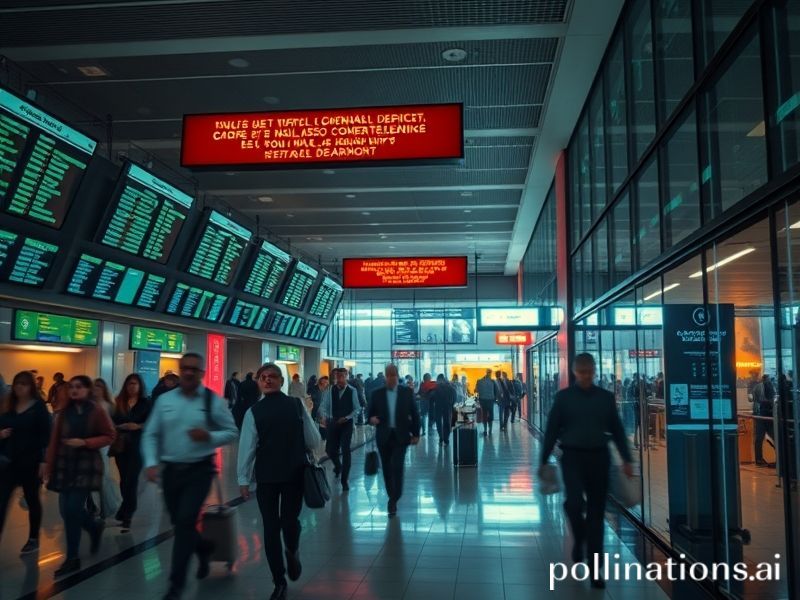Europe’s Airports Held Hostage: A Global Reminder That the Cloud Has a Silver Lining (of Ransomware)
Air-traffic controllers from Lisbon to Larnaca spent last Tuesday doing something they normally reserve for their lunch breaks: staring at empty screens with the serene expression of people who have just remembered that the cloud is not, in fact, on their side. A coordinated cyber-raid—elegant bureaucrats pronounce it “ransomware campaign,” the rest of us call it cosmic vandalism—knocked passenger-processing systems offline at sixteen European hubs, stranding roughly 140,000 irritable bipeds in the continent’s finest plastic chairs.
The timing was exquisite. Just as EU ministers were congratulating themselves on having “digitally transformed” aviation, someone with a keyboard and a moral flexibility PhD reminded them that transformation works both ways. Departures boards froze like startled deer; boarding passes reverted to the charming retro format known as “handwritten.” For a few nostalgic hours, aviation looked like 1974, minus the free meals.
Global schadenfreude arrived on schedule. American cable networks cut away from their regularly scheduled outrage to marvel at “European chaos,” blissfully ignoring the 2021 Colonial Pipeline fiasco that made their own citizens hoard gasoline in plastic bags. Meanwhile, Chinese state media tut-tutted about “Western cybersecurity hubris,” a bold stance from a country that insists the Great Firewall is for your own good. In Moscow, anonymous Telegram channels toasted the mayhem with digital champagne—though whether Russia was culprit, beneficiary, or merely amused spectator remains, as ever, an open question.
The economic arithmetic is almost poetic. Eurocontrol’s first back-of-napkin estimate put losses at €85 million per day—roughly one mid-level oligarch’s super-yacht. Add cascading delays across intercontinental routes and the bill drifts north of €400 million, enough to make even the most austerity-hardened finance minister exhale mournfully into his espresso.
Yet the true casualty is subtler: trust. Every grounded flight is a tiny referendum on the assumption that invisible systems will keep behaving. When that assumption fractures, the anxiety spreads faster than cheap perfume in economy class. Suddenly, a businessman in São Paulo reconsiders a Paris connection; a Japanese tour group wonders if Rome’s Leonardo da Vinci is next. The ripple reaches credit-rating agencies, insurers, and the shadowy priesthood that assigns risk scores to sovereign debt. In the networked age, a server farm in Bulgaria can sneeze and Tokyo catches a cold.
Europe, ever the connoisseur of summits, responded with a summit. Commissioners promised “cyber solidarity,” a phrase that sounds like a prog-rock album but actually means shared threat intelligence and—here’s the kicker—joint procurement of security software. Picture 27 procurement departments trying to agree on a firewall; Kafka would reach for popcorn.
Meanwhile, the alleged perpetrators—calling themselves “Flightless Bird Collective,” apparently not ornithology majors—issued a ransom demand denominated in Monero, the cryptocurrency preferred by connoisseurs of untraceable regret. Their press statement, helpfully translated into six EU languages plus emoji, requested “only” €15 million, roughly the catering budget for a medium-sized hub. Whether this is sophisticated extortion or merely an audition for a Netflix true-crime doc remains to be seen.
So what does it all signify, beyond the usual reminder that humanity’s reach exceeds its patch management? First, that critical infrastructure is only as strong as its most underpaid subcontractor. Second, that globalization has turned irony into a commodity: the very connectivity that lets us binge-watch Scandinavian noir on a Thai beach also lets a teenager in a basement hold a continent hostage. And third, that every crisis is now a dress rehearsal for the next one. Today it’s airports; tomorrow it’s container ports, power grids, or—God help us—coffee supply chains.
The skies are clearing now. Planes are boarding; PowerPoint slides about “lessons learned” are being polished. But somewhere in the system a dormant exploit is yawning, stretching, and checking the clock. The next attack won’t be news; it will be weather. And as any frequent flyer will tell you, the forecast is reliably unpleasant.







